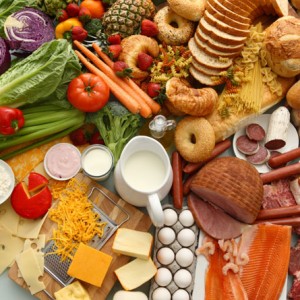Penny Wise, Pound Foolish: Food
 Thus far in this series, we’ve talked about all the things you should and shouldn’t buy as a consumer to save you money. We discussed how higher quality can cost a little extra initially, but how in the long run it can pay off to pay a little extra. I’ve ignored one thing that you should pay for though, and I hope that thus far it hasn’t been to your detriment. Yes, it makes sense, but you should be sure to pay a little extra for your food.
Thus far in this series, we’ve talked about all the things you should and shouldn’t buy as a consumer to save you money. We discussed how higher quality can cost a little extra initially, but how in the long run it can pay off to pay a little extra. I’ve ignored one thing that you should pay for though, and I hope that thus far it hasn’t been to your detriment. Yes, it makes sense, but you should be sure to pay a little extra for your food.
I can understand how you feel right now. You’re probably wondering what expense you can afford to scale back on now. If not for nothing, this series has meant to help you take a good long look at what you do spend money on so that you can pay quality there. My goal has been to get you to realize what it is you’re truly cutting back on and what sacrifices you’re making. Regardless, in this case, I want you to spend more money on food.
When I say food, though, I don’t mean fast food or restaurant fare. I want you to start spending more money on pure, raw materials such as spices, flour, eggs, milk, and produce. Yes, at first, it hurts. You will spend more money than you think you can and you’ll hate it. Your food will be terrible, and it’ll barely feel worth your while. But I ask you to stick it out. Keep to as few prepared foods as possible, and by that I include breakfast cereals, TV dinners, and canned soup. I still do admittedly keep a cheat around’“Raisin Bran, as I cannot function in the mornings without it’“but stick to my plan for now. It will help you to highlight weaknesses in the kitchen for you, and you’ll know how to plan and purchase around them. Maybe you eat a lot of salads but you’re always in a hurry. That’s fine to buy bagged prewashed lettuce then. Perhaps you are never home for dinner. A quick prep dinner when you get home (such as pasta with 10-minute sauce) is the way to go.
One thing that breaks my heart is having someone come up to me in the break room at work and goggle at the fact that I made my lunch. It’s a lost art to pack one’s lunch and an even more impressive thing to be able to cook. This should not be, as eating out can force you to spend at least twice as much as you would making your own food. And even if it didn’t, making your own food means frequently that you eat healthier, smarter, and better.
Yeah, you should buy local or organic. Does it cost more? Sure. But there’s mounting evidence to show that nutritional content is higher in foods grown in places optimal for them. That means eating what is capable of growing around you as well as eating with the seasons. It’s yet another lost art, but it’s sure to hit you less in the pocketbook. Not sure what’s good when? Click here to find out more. Hit up a good farmer’s market or buy organic when you can. It sounds trite and inaccurate, but it can often be better for you.
Do you have any tips for spending a little more intelligently? Let us know in the comments below.


Invest in containers (glass is easier to clean, more environmentally friendly, and less likely to leach chemicals than plastic BUT much more expensive), and freeze extra food for grab and go meals or at least components. Some things that I’ve found make a difference are freezing hummus, pita bread, chilis, rice, soups, stews, pesto cubes for quick sauce, and even stirfries. I also make instant oatmeal to bring to work by running batches of regular oats through a food processor, and mixing in fruit, nuts, and sugar. I keep it in a large container and pack it in half-cup containers to bring to work. Buying the ingredients on sale, it works out to less than a quarter a serving and takes about 15 minutes every few weeks.
Costco has a surprising amount of organic produce. Yes, you usually have to buy a lot (12 apples or 6 avocado or whatever) but in our family we eat about 20-24 apples a week.
Not to toot my own horn, Clint, but this is the whole point of our Stretch Your Food Dollar column. I’m glad you brought up the subject of packing your lunch, because I have been wanting to share more recipes for lunchtime adventures. More to come . . .